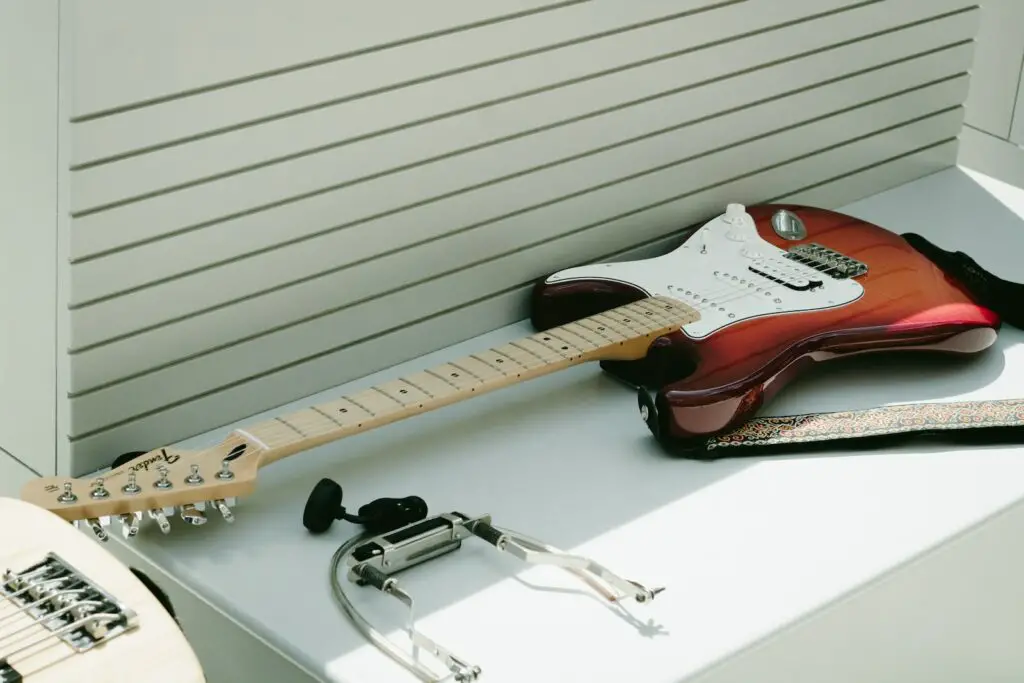The electric guitar is widely used in rock, blues, jazz, and beyond. Playing an electric guitar without electricity produces a different sound than one amplified with strings.
While you can still create music with this instrument, its tone won’t quite be the same as what amplified electric guitars produce.
An electric guitar can still be played like an acoustic, with vibrations from strings producing sound.
However, this sound will be much quieter and lacks the characteristic overdrive, distortion, and sustain electric guitars are known for.
Playing an electric guitar without electricity is a great way to practice without disturbing others while experimenting with different playing techniques.
However, to truly experience its sound, you should plug it into an amplifier and increase the volume.
Playing Electric Guitar Without Access To Electricity
Though playing an electric guitar without access to electricity may seem intimidating, there are several methods you can try.
One option is using an acoustic amplifier that can be attached directly to an electric guitar and provides plenty of volumes.
These amplifiers deliver crystal-clear audio without distortion or overdrive, making them the ideal choice for travelling musicians.
This enables playback and recording of the performance using software programs.
Practising privately is the ideal way to avoid disturbing others and produce high-quality recordings of your music.
Some amps designed for electric guitars have now been transformed into acoustic amplifier models without electricity and with a microphone input on the back.
This allows you to play your electric guitar as if it were acoustic without needing an external power source.
Musicians who need to continue performing even when no outlets are available can play an electric guitar through various methods, such as using an acoustic amplifier, connecting directly to your computer, or investing in a model designed specifically for this purpose.
Electric Guitar Power Consumption
The electricity consumption of a guitar amplifier is measured in watts per hour, ranging from 100 to 200.
While they consume electricity, guitar amps generally do not use enough power to impact an average monthly electricity bill noticeably.
Depending on usage, an amp may transmit and consume up to 6 kWh of electric energy per month.
To determine the power usage of your amplifier, refer to the product specifications. The energy consumed will depend on how many hours you use your amp daily.
However, it can be challenging to estimate the actual energy consumption of a guitar amplifier based solely on the information provided on the back of the product.
Can You Play The Electric Guitar Without Equipment?
Electric guitars are renowned for their powerful amplified sounds, making them a go-to choice for live performances and recording sessions.
Playing an electric guitar without amplification may not provide the same volume and tonal richness when played unplugged.
Unplugging an electric guitar can still be an invaluable practice tool for guitarists.
An electric guitar’s sound may be muffled without an amplifier, yet it’s still audible in quieter places such as bedrooms or practice rooms.
This allows guitarists to hone techniques like fingerpicking, strumming, and chord changes without needing extra equipment.
Is It Accurate To Say That Batteries Power Electric Guitars?
Electric guitars use pickups to capture the sound of vibrating strings and convert it into an electrical signal that can be amplified.
Passive pickups, common on most electric guitars, use magnets to generate this signal without an external power source.
Active pickups are electronic ones commonly used in electric guitars that use a small preamp to boost the signal from the guitar’s strings before reaching the amplifier.
This additional boost can produce higher output and more aggressive tones, making active pickups popular among heavy metal and hard rock guitarists.
Active pickups require power sources like 9V batteries which must be replaced periodically, so guitarists must always ensure they have an extra battery ready.
What Is the Average Lifespan Of An Electric Guitar?
The lifespan of an electric guitar depends on several factors, including its materials, construction techniques, frequency of use and care provided.
With proper care and maintenance, a budget-friendly acoustic or classical guitar may last around ten years.
However, an affordable electric guitar could last 10-15 years with proper care and maintenance.
However, investing in a high-end guitar can significantly extend its lifespan–sometimes up to one lifetime.
Expensive models of acoustic and electric guitars typically boast superior materials and precision craftsmanship that guarantee better instruments that will last over time. Maintaining and storing a guitar properly can significantly extend its life.
Regular guitar maintenance is essential to increase its life and optimise performance, including cleaning, restringing, and keeping the instrument in a controlled environment.
Cleaning a guitar involves eliminating dirt, dust, and grime that has built up over time. This can be accomplished using a soft cloth with some guitar cleaner or polish applied.
Which Type Of Guitar Doesn’t Need Electricity?
Acoustic guitars are self-powered instruments that don’t need external amplifiers to generate sound.
Instead, the strings of an acoustic guitar are struck or plucked, creating vibrations amplified by its hollow body or soundboard.
This makes acoustics ideal for performing in intimate settings or practising at home without needing extra gear.
Furthermore, musicians often favour these guitars due to their warm, natural sound, which can be enhanced using various playing techniques and tailored accessories for each instrument.
Is Wires Necessary for Electric Guitars?
Guitarists understand the significance of pedals in their setup.
Pedals offer unique and personalised tones tailored to your music style, but buying one in creating your pedalboard – all you need is an additional cable to connect it to your guitar.
Most guitars and pedals come without cables, which also applies to pedals.
Pedals require two cables to connect to both input and output ports, your pedal won’t function properly if you don’t have an extra cable handy.
Don’t worry about finding the correct size; each guitar jack has specific dimensions. Investing in high-quality cables for optimal sound is essential when purchasing a pedal.
These will enhance your guitar’s tone and overall audio, and having such an item allows you to get the most from your pedal while creating the ideal ambiance.
Remember to pick up an extra cable when selecting your new guitar so everything’s set – don’t skimp out.





